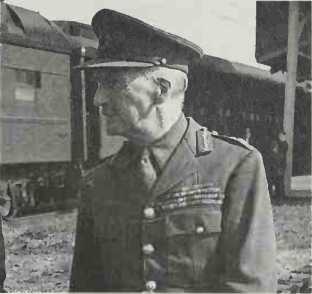Tain Division at Narvik, April-June 1940, during the Norwegian campaign.
Dietrich, Gen (Oberstgruppenfii-brer, SS) Josef (1892-1966). Ger. After service in World War I as a sergeant and a brief period in the Bavarian police, Dietrich joined the Nazi Party and the SS in 1928. He rose rapidly through its ranks and, in 1938, was given command of Hitler’s bodyguard. This unit subsequently became the Lieb-standarte SS Adolf Hitler and Dietrich remained its commander as it expanded from a motorized infantry unit to a full panzer division. He played a leading role in Munich during the “Night of the Long Knives”. He led his unit in the invasions of Poland, Holland, France, Yugoslavia, Greece and the Soviet Union. In the process, Dietrich became one of Hitler’s favourite generals and was given command of the Sixth Panzer Army in the Ardennes offensive. Far from achieving the miraculous victory Hitler sought, the German attack failed while the atrocities perpetrated by Dietrich’s men during the fighting were to have far-reaching consequences. He fought in the concluding campaigns of the war in Hungary and Austria before surrendering to American forces in May 1945. He was tried and convicted of being responsible for the massacre of American prisoners during the Battle of the Bulge and was sentenced to life imprisonment. Released in 1955, he was re-arrested and tried before a German court for his part in the Night of the Long Knives and was sentenced to 18 months’ imprisonment. MS.
Dill, Field Marshal Sir John
(1881-1944). Br. Already a possible candidate for future high command, Dill held a succession of staff posts on the Western Front before he was appointed head of the Operations Branch at British GHQ in France in March 1918. His reputation grew between the wars and, after serving as Commandant of the Staff College and as Director of Military Operations, he became Goc-in-c, Aldershot, from 1937 to 1939. His expected elevation to GIGS did not materialize immediately and, on the outbreak of World War II, he was instead

Dill: British cigs, 1940-41
Given command of I Corps of the Expeditionary Force in France. Recalled in April 1940 to fill the new post of Vice-Chief of the Imperial General Staff, he finally re. placed Ironside as gigs on May 27. His term as gigs was not a distinguished one, coinciding with a low point in British military fortunes. His desire to avoid risky ventures caused Churchill to regard him as obstructive and unimaginative and, following further British reverses in Greece, Crete and North Africa, Dill was himself succeeded by Brooke in November 1941. Upon America’s entry into the war, he went to Washington as Head of the British Joint Staff Mission and senior British member of the Combined Chiefs of Staff Committee. When Dill died in November 1944, President Roosevelt described him as “the most important figure in the remarkable accord which has been developed in the combined operations of our two countries”. PJS.
Dimitriev, Gen Radko (18591919). Bulgarian. Dimitriev graduated from the Military School in Sofia and continued his military education at the General Staff Academy in St Petersburg before returning to Bulgaria in 1885 to take part in the war with Serbia. Deeply involved in political intrigue in Bulgaria, he was obliged to go into exile in Russia, where he joined the army. Dimitriev returned home 10 years later and in 1902 was appointed Chief of the General Staff. He laid plans for a war with Turkey but after a change of government, he was moved to be Inspector-General of the Third Army District. Following the outbreak of the Balkan War {see Balkan war), in October 1912 Dimitriev’s forces invaded Thrace and in November he led an abortive attempt to force the Cha-talja Lines guarding Constantinople (Istanbul).
On the outbreak of World War I, Dimitriev relinquished his post as Bulgaria’s minister in St Petersburg and rejoined the Russian Army. He served with distinction in the opening operations of the war, notably at the Battle of Cracow in November 1914. Commanding the Third Army in the spring of 1915 he won a victory on the River Dunajec but was forced to withdraw in the face of the Central Powers’ offensive. However his “over confidence” was blamed for the fall of Przemysl and he was relieved of his command. But he returned to service on the Baltic front, blocking German efforts against Riga. Typically, Dimitriev’s colourful career ended in controversial circumstances after the Revolution, when he was murdered by the Bolsheviks at Pyatigorsk in 1919. MS.
Directed Energy Weapon (DEW).
A weapon which uses beams of electromagnetic radiation or atomic particles to inflict damage. These beams travel at very high speeds up to and including the speed of light i. e. reaching the target as soon as they are fired at it. One important group of dew is lasers which fire coherent beams of electromagnetic radiation. Chemical lasers produce light by the reaction of gases, e. g. hydrogen and fluorine. Free electron lasers pass electrons through a magnetic field that can be varied to alter the wavelength of the radiation. Ex-cimer lasers create pulses of light by the creation and decay of “dimers”, molecules of inert and halogen gases. X-ray lasers convert the power of nuclear explosions into a beam, and are sometimes called “third generation nuclear weapons”. Particle beam weapons accelerate charged particles, e. g. electrons, to high speeds; in some systems, larger particles are used in neutral beams, dews still face many technical problems but low-powered lasers have been deployed in various modes, dews are usually thought to have their greates potential in space and in anti-ballistic missile applications. EJG.




 World History
World History









